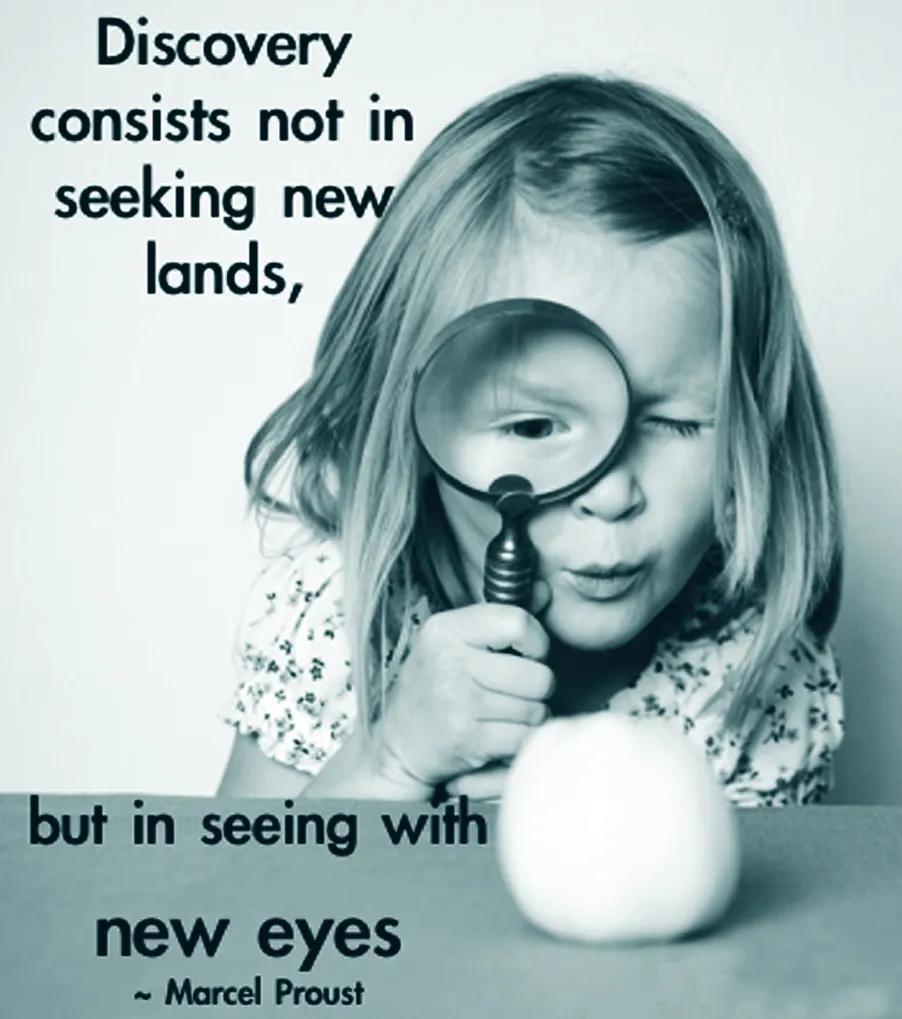Why We Travel
2014-12-14ByPicoIyer
By Pico Iyer

W e travel, initially, to lose ourselves; and we travel, next, to find ourselves. We travel to open our hearts and eyes and learn more about the world than our newspapers will accommodate1. accommodate: 容纳,为……提供充足的空间。. We travel to bring what little we can, in our ignorance and knowledge, to those parts of the globe whose riches are differently dispersed2. disperse: 传播,散发。. And we travel, in essence, to become young fools again—to slow time down and get taken in, and fall in love once more.
The beauty of this whole process was best described, perhaps, before people even took to frequent flying, by George Santayana in his lapidary essay, “The Philosophy of Travel.”3. George Santayanae: 乔治·桑塔亚那,西班牙裔美国哲学家、散文家、小说家;lapidary:(措词等)像碑文那样优雅、简洁而精确的。We“need sometimes,” the Harvard philosopher wrote,“to escape into open solitudes, into aimlessness,into the moral holiday of running some pure hazard, in order to sharpen the edge of life, to taste hardship, and to be compelled to work desperately for a moment at no matter what.”
旅行首先是为了忘却自我,然后是为了寻找自我。旅行是为了开阔心胸、开拓眼界,更多地了解这个世界,而不是仅仅依赖报纸告诉我们的信息。旅行是为了尽我们所能为世上的另外一些地方带去(文化)财富——无论是有意为之还是无心插柳——物质和精神文化财富在世界各地呈现出不同的形态。而最重要的是,旅行是为了再度变得年少无知——放慢时光,如痴如醉,再次体会爱的感觉。
早在出门远游成为家常便饭以前,乔治·桑塔亚那在他那篇精美的散文《旅行的哲学》中,就已经描述了这其中的美妙之处,这段描写也许无出其右。这位哈佛哲学家写道:“有时我们需要逃遁,到一些广袤孤绝的环境,过一段漫无目的的光阴,度一个陶冶情操、随缘随性的假期,这样才能更加敏感地品味生活,体会艰辛的滋味,为了片刻的逍遥而拼命工作。”
假期到来,总要告别单调的生活模式,踏上一段旅程。但是一来二去,有人发出了“旅行就是从自己活腻的地方到别人活腻的地方去”的感慨。乍一听来,似乎有些道理,但细细想来,此语似乎仅看到了“游山玩水”的视觉享受。其实旅行的意义远非如此。人在旅途,不仅是新鲜文化的接受者,也是本地文化的传播者,一个全新的世界展现在你的面前,你也代表了一个打破常规的新世界。
I like that stress on work, since never more than on the road are we shown how proportional our blessings are to the difficulty that precedes them;and I like the stress on a holiday that’s “moral”since we fall into our ethical habits as easily as into our beds at night. Few of us ever forget the connection between “travel” and “travail,”and I know that I travel in large part in search of hardship—both my own, which I want to feel, and others’, which I need to see. Travel in that sense guides us toward a better balance of wisdom and compassion—of seeing the world clearly, and yet feeling it truly. For seeing without feeling can obviously be uncaring; while feeling without seeing can be blind.
Yet for me the first great joy of traveling is simply the luxury of leaving all my beliefs and certainties at home, and seeing everything I thought I knew in a different light, and from a crooked angle. In that regard, even a Kentucky Fried Chicken outlet (in Bengal) or a scratchy revival showing of Wild Orchids (on the Champs-Elysees) can be both novelty and revelation: In Bengal, after all, people will pay a whole week’s wages to eat with Colonel Sanders,and in Paris, Mickey Rourke is regarded as the greatest actor since Jerry Lewis.4. Wild Orchids: 《野兰花》,美国情色电影;Colonel Sanders: 桑德斯上校,肯德基(KFC)的创始人;Mikey Rourke: 米基·洛克,美国影星,曾主演《野兰花》、《摔跤手》、《斗鱼》等影片;Jerry Lewis:杰瑞·刘易斯,美国著名喜剧演员,第81届奥斯卡“琼·赫尔肖特人道主义奖”获得者。
我喜欢这段话对工作的强调,因为只有走在路上,才能深切体会先苦后甜的过程中,先前的苦和之后的甜是成正比的;同时我也喜欢这段话对假日陶冶情操的强调,因为养成道德习惯和晚上倒床就寝一样容易。我们很少会忘记“旅行”和“苦行”之间的联系,我自己就很清楚,我出门远行主要是为了寻觅艰苦——自己的艰苦愿能体会,他人的艰苦需要目睹。从这个意义上说,旅行可以指引我们更好地把握智慧和悲悯的平衡——更加清晰地认识世界,同时也能深切感受到世间况味。有见地无感受显然太不近人情,而有感受无见地则是盲目无知。
然而对我来说,旅行的第一大乐事,莫过于暂时抛下成见和确信,用不同的眼光和别样的视角打量我自认为已经了解的事物。这样一来,孟加拉的肯德基门店和香榭丽舍大街上粗糙的《野兰花》怀旧展演都极为新奇,令人大开眼界:毕竟在孟加拉,人们会花上一星期的辛苦钱吃一顿肯德基;而在巴黎,米基·洛克被视为继杰瑞·刘易斯之后最伟大的演员。
If a Mongolian restaurant seems exotic to us in Evanston, Ill., it only follows that a McDonald’s would seem equally exotic in Ulan Bator—or, at least, equally far from everything expected. Though it’s fashionable nowadays to draw a distinction between the “tourist” and the “traveler,” perhaps the real distinction lies between those who leave their assumptions at home, and those who don’t: Among those who don’t, a tourist is just someone who complains, “Nothing here is the way it is at home,”while a traveler is one who grumbles, “Everything here is the same as it is in Cairo—or Cuzco or Kathmandu.” It’s all very much the same.
But for the rest of us, the sovereign freedom of traveling comes from the fact that it whirls you around and turns you upside down, and stands everything you took for granted on its head. We travel, then, in part just to shake up our complacencies6. Tylenol: 泰诺(一种尤用于头疼的止痛片)。by seeing all the moral and political urgencies, the life-and-death dilemmas, that we seldom have to face at home. And we travel to fill in the gaps left by tomorrow’s headlines: When you drive down the streets of Port-au-Prince, for example, where there is almost no paving and women relieve themselves next to mountains of trash, your notions of the Internet and a “one world order” grow usefully revised. Travel is the best way we have of rescuing the humanity of places, and saving them from abstraction and ideology.
And in the process, we also get saved from abstraction ourselves, and come to see how much we can bring to the places we visit, and how much we can become a kind of carrier pigeon—an anti-Federal Express, if you like—in transporting back and forth what every culture needs. I find that I always take Michael Jordan posters to Kyoto,and bring woven ikebana baskets back to California; I invariably travel to Cuba with a suitcase piled high with bottles of Tylenol6. Tylenol: 泰诺(一种尤用于头疼的止痛片)。and bars of soap, and come back with one piled high with salsa tapes, and hopes, and letters to long-lost brothers.
如果我们觉得蒙古餐厅开在伊利诺伊州埃文斯顿颇有异域风情,那么肯德基在乌兰巴托也同样有异域风情——至少同样出人意料。尽管时下流行区分“游客”和“旅者”,但也许真正应该区分的是这样两种人,一种会抛下原有的习闻习见,而另一种不会这么做:在后面这些人当中,游客会抱怨“这地方跟家里什么都不一样”,旅者会不满“这里跟开罗或者库斯科、加德满都这些地方其实都一样”。看似截然相反,其实都是同理。
但对于我们当中的另外一些人,旅行能带来至高无上的自由,因为它使人目眩神迷,给人以天翻地覆之感,促使人们重新审视以往视为理所当然的一切。这样说来,旅行的目的,一部分是为了目睹家中很少遇到的各种关乎道德和政治的紧急情况,甚至生死攸关的两难困境,从而撼动内心的自满情绪。同时,通过旅行我们也可以填补报纸头条之间的大量空白:比如当你驱车行驶在太子港的街头,几乎没有人行道,妇女在堆积如山的垃圾上大小便,你一定会重新审视互联网和“统一世界秩序”的概念,而这种思考十分有意义。旅行是一种绝佳的方式,可以挽救那些基于具体地域的人性观,而不仅仅把人性抽象化、建立于虚无缥缈的意识形态之上。
在此过程中,我们也可以避免自身的抽象化,逐渐意识到我们能为所到之处带来什么,意识到我们可以充当类似信鸽的角色——或者反联邦快递也行——来回传播每种文化需要的事物。我自己就总把迈克尔·乔丹的海报带到京都,把手编插花篮子带回加州;每次去古巴都戴上一大箱瓶装泰勒诺和块状香皂,然后带回一大箱莎莎舞录像带,同时也给失散已久的兄弟们带回希望和书信。
But more signi ficantly,we carry values and beliefs and news to the places we go, and in many parts of the world,we become walking video screens and living newspapers, the only channels that can take people out of the censored limits of their homelands.In closed or impoverished places, like Havana, we are the eyes and ears of the people we meet, their only contact with the world outside and, very often, the closest, quite literally, they will ever come to Michael Jackson or Princess Kate.
By now all of us have heard (too often) the old Proust7. Proust: 马塞尔·普鲁斯特(1871—1922),20世纪法国最伟大的小说家之一,意识流文学的先驱与大师。line about how the real voyage of discovery consists not in seeing new places but in seeing with new eyes. Yet one of the subtler beauties of travel is that it enables you to bring new eyes to the people you encounter. Thus even as holidays help you appreciate your own home more—not least by seeing it through a distant admirer’s eyes—they help you bring newly appreciative—distant—eyes to the places you visit. You can teach them what they have to celebrate as much as you celebrate what they have to teach. This, I think, is how tourism, which so obviously destroys cultures, can also resuscitate or revive them,how it has created new “traditional” dances in Bali, and caused craftsmen in India to pay new attention to their works. If the first thing we can bring the Cubans is a real and balanced sense of what contemporary America is like, the second—and perhaps more important—thing we can bring them is a fresh and renewed sense of how special are the warmth and beauty of their country, for those who can compare it with other places around the globe.

但更重要的是,我们为所到之处带去价值观、信念和讯息,而且在世界很多地方,我们成了鲜活的荧屏和报纸,只有通过我们这些渠道,当地的人们才能挣脱故乡的种种外界审查的限制。在哈瓦那这样闭塞贫困的地方,我们对于遇到的人们来说如同耳目,是他们与外面世界沟通的唯一渠道,而且很可能是他们此生与迈克尔·杰克逊或者凯特王妃距离最近的时候。
到现在我们也许已经太多次听到普鲁斯特那句耳熟能详的话,他说真正的发现之旅不在于看到新奇的地方,而是用全新的眼光看世界。但是旅行的一个更微妙的好处,是可以将全新的眼光带给遇到的人。这样,外出度假不仅可以让你更能体会故乡的美好——尤其是以一个远观者的视角欣赏故乡的时候——同时也可以将全新的远观欣赏的视角带给我们所到之处。你可以告诉他们有什么值得欣赏,也可以欣赏到他们传达给你的赏心乐事。由此我认为,旅行虽然表面上摧残文化,但其实也可以复兴文化、给文化注入新的活力,使得巴厘岛的“传统”舞蹈旧貌换新颜,也使得印度工匠以全新的态度关注他们的作品。如果说我们带给古巴人的首先是真实全面的当代美国风貌,那么另外还有——或许更为重要的——赖以重新审视祖国的新视角,让他们意识到自己的祖国是何等地温暖美丽、无可替代,尤其是对于那些有能力将祖国与其他地方相比较的人们而言。
Thus travel spins us round in two ways at once: It shows us the sights and values and issues that we might ordinarily ignore; but it also, and more deeply, shows us all the parts of ourselves that might otherwise grow rusty. For in traveling to a truly foreign place, we inevitably travel to moods and states of mind and hidden inward passages that we’d otherwise seldom have cause to visit.
On the most basic level, when I’m in Thailand, though a teetotaler who usually goes to bed at 9 p.m., I stay up till dawn in the local bars; and in Tibet, though not a real Buddhist, I spend days on end in temples, listening to the chants of sutras.I go to Iceland to visit the lunar spaces within me, and, in the uncanny quietude and emptiness of that vast and treeless world, to tap parts of myself generally obscured by chatter and routine.
We travel, then, in search of both self and anonymity— and,of course, in finding the one we apprehend the other. Abroad,we are wonderfully free of caste and job and standing; we are,as Hazlitt8. Hazlitt: 哈兹里特,英国散文家、评论家。puts it, just the “gentlemen in the parlour,” and people cannot put a name or tag to us. And precisely because we are clari fied in this way, and freed of inessential labels, we have the opportunity to come into contact with more essential parts of ourselves (which may begin to explain why we may feel most alive when far from home).
Abroad is the place where we stay up late, follow impulse and find ourselves as wide open as when we are in love. We live without a past or future, for a moment at least, and are ourselves up for grabs and open to interpretation. We even may become mysterious—to others, at first, and sometimes to ourselves—and, as no less a dignitary than Oliver Cromwell9. Oliver Cromwell: 奥利弗·克伦威尔,英国17世纪资产阶级革命领袖、政治家、军事家。once noted, “A man never goes so far as when he doesn’t know where he is going.”
这样,旅行同时从两个方面颠覆我们的思维:它向我们展示平日很可能视而不见的风光、价值观和问题;但同时而且是更深刻的是,它让我们看到自己内心的方方面面,不去发现就很有可能渐渐磨蚀的东西。旅行到真正的异国他乡,实际上就是旅行到我们其他时候很少顾及的心境、思维方式和潜藏的内心活动。
从最基本的层面看,我尽管平时严格戒酒、通常晚上九点睡,但到了泰国就在当地酒吧通宵娱乐;尽管不是真正的佛教徒,但在西藏还是连续若干天待在各个寺庙聆听诵经。我去冰岛感受月光般恬静的心境,沉浸在广袤无树的世界里那种奇异的静谧空灵之中,轻轻敲醒自己平日淹没在喧嚣和俗套里的那部分内心世界。
这样,旅行既是为了寻找自己,也是为了忘却自己——当然,通过寻找自己自然能理解自己的渺小,从而臻于忘我的境界。在异国他乡,我们可以完全摆脱等级、职业和地位的束缚。正如哈兹里特所言,我们就像“座上客”,不必受到名分和标签的限定。正因为挣脱了束缚、摆脱了无意义的标签,我们才有机会接触到自己内心更为重要的层面(这或许可以初步解释为什么我们在远离家园时感到活力四射)。
身在异国他乡,正宜深夜不寝、随心所欲,像恋爱那样忘情沉醉。哪怕只有短暂的一瞬,也可以暂时抛却过去和未来,做真实的自己,容许随意解读。我们甚至可能披上一层神秘面纱——首先在他人眼中如此,然后有时我们自己也能感受到——正如奥利弗·克伦威尔这位高人曾经说过的那样,“人只有不知道去向何方,才能走得最远”。
